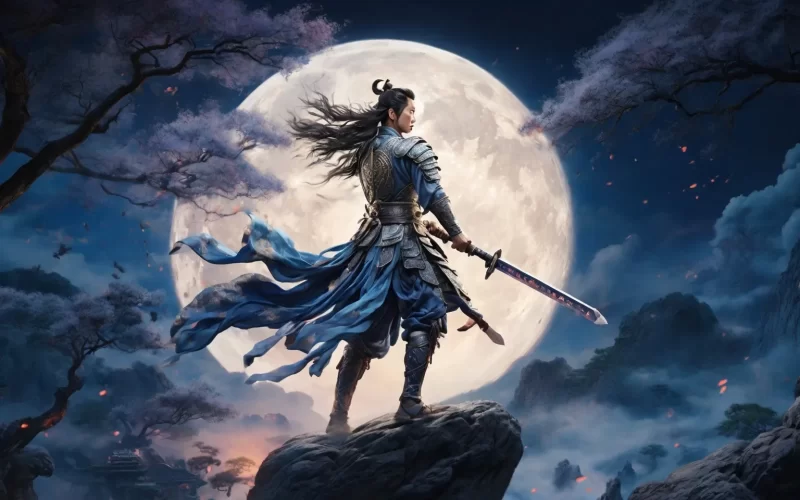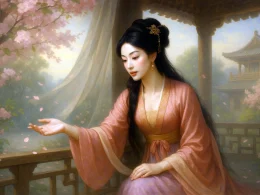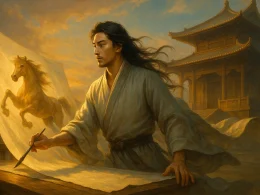This constellation, with its seven high stars,
Is Ge Shu lifting his sword in the night:
And no more barbarians, nor their horses, nor cattle,
Dare ford the river boundary.
Original Poem
「哥舒歌」
西鄙人
北斗七星高,哥舒夜带刀。
至今窥牧马,不敢过临洮。
Interpretation
Originating during Emperor Xuanzong's Tianbao era, this folk-inspired ode celebrates General Geshu Han, a Turkic commander who rose to become Protector-General of Longyou. His repeated victories against Tibetan invasions secured the northwestern borders, earning deep admiration from frontier communities. The poem blends historical tribute with vibrant folk lyricism.
First Couplet: "北斗七星高,哥舒夜带刀。"
"Běidǒu qī xīng gāo, Gēshū yè dài dāo."
High hangs the Northern Dipper's seven-starred light, While Geshu patrols armed through the night.
The celestial imagery (北斗七星) establishes both the late hour and Geshu's cosmic-level vigilance. His "night-blade" (夜带刀) epitomizes constant readiness, portraying border defense as an unending sacred duty rather than mere battlefield glory.
Second Couplet: "至今窥牧马,不敢过临洮。"
"Zhìjīn kuī mù mǎ, bù gǎn guò Lintáo."
Though Tibetan scouts still spy on grazing herds, None dare cross near Lintáo's borders.
The couplet contrasts lingering threats ("spy on grazing herds") with enduring deterrence ("dare cross"), proving Geshu's legacy outlasts his physical presence. Lintáo (临洮), a strategic garrison town, becomes the symbolic threshold where his reputation alone maintains peace.
Holistic Appreciation
Though only four lines long, the poem masterfully condenses the awe-inspiring image of General Geshu Han—his formidable presence striking fear into enemy hearts. The opening line uses the "Big Dipper" to frame the general patrolling the border at night, sword in hand, creating a solemn and majestic atmosphere. The closing line highlights his prestige through tangible results: frontier security so absolute that invaders dare not approach. Without depicting actual combat, the poem conveys both the tension of the borderlands and the general's unshakable composure through subtle yet powerful strokes, blending folk ballad simplicity with heroic grandeur.
Artistic Merits
The poem's language is concise and unadorned, its cadence rhythmic and forceful, bearing distinct folk-song qualities. Through evocative imagery and indirect narration—avoiding direct battle scenes—it crystallizes Geshu Han's martial prowess and frontier dominance with details like "sword at night" and "none dare cross." Crucially, it channels the perspective of common people, authentically reflecting the general's revered status among border communities. This grassroots viewpoint lends the work both political resonance and enduring relevance.
Insights
A masterclass in minimalism, the poem demonstrates that heroism need not be declaimed—it can radiate from quiet vigilance, from the steadfast presence of a sentinel under starlight. Its folk-infused admiration reminds us to honor those who guard borders and peace without fanfare, proving that true might lies not in triumphalism, but in the discipline to stand watch while the world sleeps.
Poem translator
Kiang Kanghu
About the Poet
Xibiren (西鄙人), meaning "a person from the northwestern frontier," represents the anonymous poets of the Tang Dynasty's borderlands. Only one of his poems, "General Ge Shu", is preserved in the Complete Tang Poems. In just twenty characters, the poem captures the grandeur of the High Tang frontier spirit. Its language is simple, reminiscent of folk songs, yet powerful and majestic—celebrating the fame of General Geshu Han while reflecting the pride of borderland soldiers and civilians.












